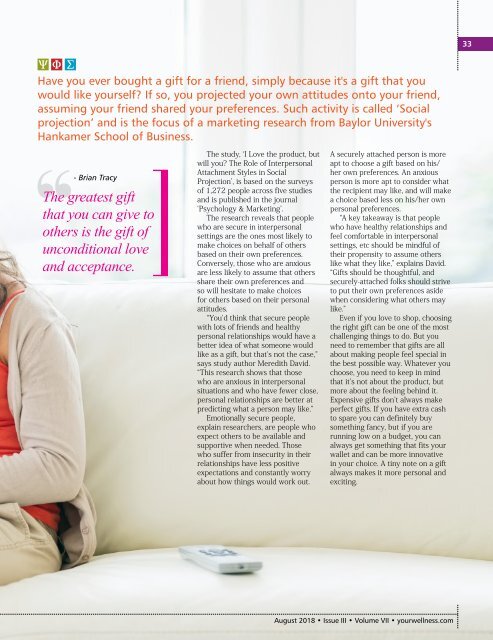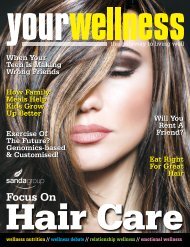You also want an ePaper? Increase the reach of your titles
YUMPU automatically turns print PDFs into web optimized ePapers that Google loves.
33<br />
Have you ever bought a gift for a friend, simply because it's a gift that you<br />
would like yourself? If so, you projected your own attitudes onto your friend,<br />
assuming your friend shared your preferences. Such activity is called ‘Social<br />
projection’ and is the focus of a marketing research from Baylor University's<br />
Hankamer School of Business.<br />
- Brian Tracy<br />
The greatest gift<br />
that you can give to<br />
others is the gift of<br />
unconditional love<br />
and acceptance.<br />
The study, ‘I Love the product, but<br />
will you? The Role of Interpersonal<br />
Attachment Styles in Social<br />
Projection’, is based on the surveys<br />
of 1,272 people across five studies<br />
and is published in the journal<br />
‘Psychology & Marketing’.<br />
The research reveals that people<br />
who are secure in interpersonal<br />
settings are the ones most likely to<br />
make choices on behalf of others<br />
based on their own preferences.<br />
Conversely, those who are anxious<br />
are less likely to assume that others<br />
share their own preferences and<br />
so will hesitate to make choices<br />
for others based on their personal<br />
attitudes.<br />
“You'd think that secure people<br />
with lots of friends and healthy<br />
personal relationships would have a<br />
better idea of what someone would<br />
like as a gift, but that's not the case,"<br />
says study author Meredith David.<br />
“This research shows that those<br />
who are anxious in interpersonal<br />
situations and who have fewer close,<br />
personal relationships are better at<br />
predicting what a person may like.”<br />
Emotionally secure people,<br />
explain researchers, are people who<br />
expect others to be available and<br />
supportive when needed. Those<br />
who suffer from insecurity in their<br />
relationships have less positive<br />
expectations and constantly worry<br />
about how things would work out.<br />
A securely attached person is more<br />
apt to choose a gift based on his/<br />
her own preferences. An anxious<br />
person is more apt to consider what<br />
the recipient may like, and will make<br />
a choice based less on his/her own<br />
personal preferences.<br />
“A key takeaway is that people<br />
who have healthy relationships and<br />
feel comfortable in interpersonal<br />
settings, etc should be mindful of<br />
their propensity to assume others<br />
like what they like,” explains David.<br />
“Gifts should be thoughtful, and<br />
securely-attached folks should strive<br />
to put their own preferences aside<br />
when considering what others may<br />
like.”<br />
Even if you love to shop, choosing<br />
the right gift can be one of the most<br />
challenging things to do. But you<br />
need to remember that gifts are all<br />
about making people feel special in<br />
the best possible way. Whatever you<br />
choose, you need to keep in mind<br />
that it’s not about the product, but<br />
more about the feeling behind it.<br />
Expensive gifts don’t always make<br />
perfect gifts. If you have extra cash<br />
to spare you can definitely buy<br />
something fancy, but if you are<br />
running low on a budget, you can<br />
always get something that fits your<br />
wallet and can be more innovative<br />
in your choice. A tiny note on a gift<br />
always makes it more personal and<br />
exciting.<br />
<strong>August</strong> <strong>2018</strong> • Issue III • Volume VII • yourwellness.com




